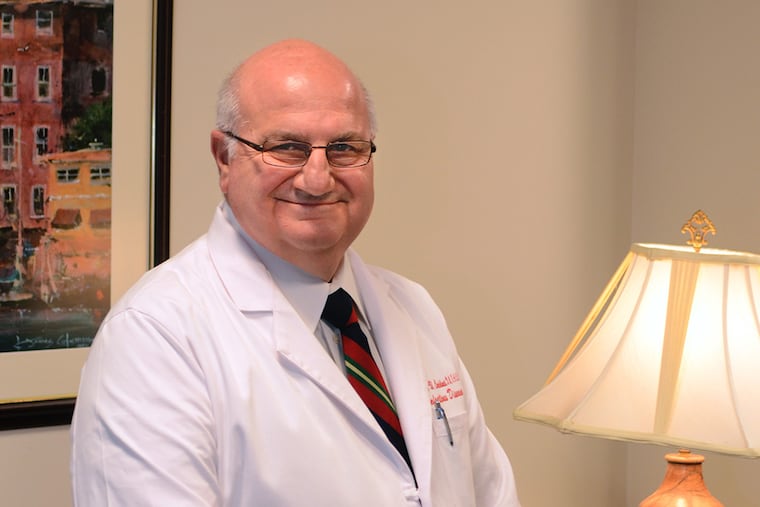Early warrior against AIDS still fighting the good fight
The young man was wasting away in his Philadelphia hospital bed, and the young physician treating him couldn't figure out what was wrong.

The young man was wasting away in his Philadelphia hospital bed, and the young physician treating him couldn't figure out what was wrong.
"He had diarrhea, and he had one pneumonia after another," David V. Condoluci recalls. "I felt so inadequate. Everything I was doing wasn't working. And then, he died."
In the summer of 1981, the first cases of what would come to be called AIDS emerged in America - including at the Hospital of the Philadelphia College of Osteopathic Medicine.
Condoluci, an infectious disease specialist who grew up in Rochester, N.Y., had just launched his career at PCOM. He couldn't have known that his young patient's mysterious ailment was the harbinger of a global epidemic.
And he couldn't have imagined how profoundly it would change his life. The married father of two became a leader in fighting AIDS and HIV infections in South Jersey and beyond. Three decades later, he's still at it.
"I hate to put it this way, but I think this is my calling," says Condoluci, 64, who has been associated with the Kennedy Health System since 1983 and became its chief medical officer two years ago. "I think I was meant to do this."
Condoluci, of Moorestown, heads up one of the region's go-to HIV practices. He's a respected presence in the community, the media, and professional circles.
I met "Doctor Condo" 30 years ago, when I was writing regularly about AIDS. His matter-of-fact compassion was as impressive as his command of the facts.
"People were dying left and right," he says. "It was a sad time, a difficult time, and it was difficult for health-care workers, too. A lot of people got burned out, because there was death all around them."
As the epidemic raged in the gay community and among intravenous drug users in the 1980s, "discrimination was terrible," he continues. "AIDS was not just a medical issue, but a political and social issue, too."
I remember it well. Some on the right proclaimed that AIDS was God's punishment for homosexuality. From the White House, meanwhile, silence: Ronald Reagan, the "Great Communicator," didn't give a major speech on this national public health crisis until 1987, six years after the first cases were reported.
Like others on the front line, Condoluci was interested in sharing information, not dogma.
In 1989, he founded the annual HIV Medical Update conference, so that health-care professionals dealing with AIDS could network and share information. As the epidemic has evolved, he says, so have treatments and the focus of the conference.
More than 150 doctors, nurses, and others are registered for the 25th anniversary session of the conference on Wednesday at the Crowne Plaza hotel in Cherry Hill.
"The disease has become more mainstream," he notes. "But there's still a certain stigma about it."
By the mid-1990s, AIDS treatment was revolutionized as combinations, or "cocktail" regimens, of antiviral drugs began saving lives. "It was like Lazarus," Condoluci says. "We saw these miraculous changes in patients."
One of those who came back from the brink was Steve Burch, now a 54-year-old Collingswood resident.
"It wasn't looking good for me," says Burch, a customer service representative. He had given away his possessions and entered a hospice program, but when the drugs became available, "Dr. Condoluci brought me through."
Alan Koch, former board member and president of the AIDS Coalition of Southern New Jersey, says Condoluci's practice, Garden State Infectious Disease Associates in Voorhees, "was cutting-edge . . . and I'm sure they prolonged, and saved, many lives."
Condoluci notes that treatment regimens that involved as many as 30 daily pills in the 1990s now are administered with one.
People have been able to live with AIDS for two decades and counting.
"If you take your meds, you won't die of AIDS," Condoluci says. "But there are still millions of people in the world who don't have the drugs. And the virus is the same as it was in 1981. It will kill you."
Nevertheless, "we're so much in a better place now," says Condoluci, who ought to know.
After all, he helped get us here.
856-779-3845 @inqkriordan